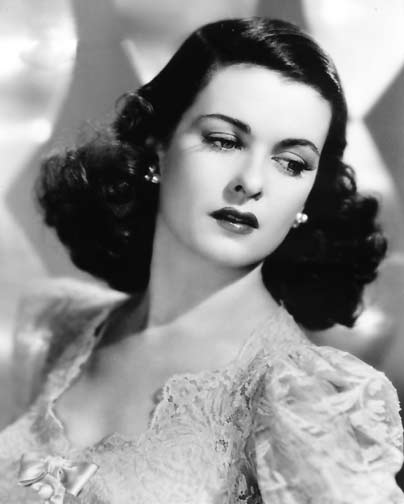Joan Geraldine Bennett (Joan Geraldine Bennett)

Actress. The youngest of the three acting daughters of prominent stage and screen star Richard Bennett, she was the last of the sisters to enter films seriously, but she had the longest and, in retrospect, the most meaningful career of any of her family. Joan, like Constance and Barbara, was a gorgeous woman, slender and blond, with dramatic eyes. She acted in numerous films during the 1930s, many of which were important, such as Disraeli and Little Women, but none of them was particularly noteworthy for her participation. It was not until the late 1930s when she dyed her hair dark brown that Bennett became more than just another beautiful Hollywood blond and began to have significant impact on films. She frequently played a sultry femme fatale in her new image, outstandingly beautiful but destructive. In her two most highly regarded films, “The Woman in the Window” and “Scarlet Street,” both directed by Fritz Lang, she displayed a cool, pernicious character, the antithesis of the mild-mannered, unsophisticated common man played by Edward G. Robinson in each film. In these two films, as well as others such as Jean Renoir’s “The Woman on the Beach,” Bennett was able to appear beautifully innocent and vulnerable on the surface, while hiding a stony evilness on the inside. Lang, and others, have expressed great admiration for Bennett’s contributions to her films of this period, and some critics have called her the epitome of the film noir heroine. Yet, despite her success in dramatic roles, Bennett also acted successfully in more sympathetic comedy roles. At age 40, and still a very beautiful, young-looking woman, she was very charming in the box-office success “Father of the Bride,” portraying Spencer Tracy’s wife and Elizabeth Taylor’s mother. Unlike many other beautiful actresses, Bennett decided to begin playing older parts before she actually needed to. She also took chances in her career and varied her roles, dividing her time among costume epics, melodramas, and tearjerkers such as Max Ophils’s “The Reckless Moment” and Douglas Sirk’s “There’s Always Tomorrow.” In the latter film, Bennett played a boring housewife married to Fred MacMurray who feels stifled by her presence and that of their children and contemplates leaving them for a former sweetheart. Bennett’s career flourished in the 1940s not only because of her change of hair color(she became a permanent brunette for the 1938 film “Trade Winds”) but also because of her marriage to the prominent producer Walter Wanger. Wanger guided her career and can take much of the credit for the powerful roles which she accepted. He produced many of the films in which she appeared during their marriage, and provided her with some of the outstanding European directors who were working in Hollywood during that period. They divorced relatively quietly in 1965, but their relationship created international headlines in 1951 when Wanger shot Bennett’s agent Jennings Lang, purportedly out of jealousy; Wanger went briefly to prison. By 1956 Bennett had virtually retired from films and thereafter confined herself to occasional theater and television work. From the mid-1950s on, her most prominent role was as one of the main characters of the very popular supernatural television soap opera, “Dark Shadows,” the only long-running daytime serial in history to spawn both a film, “House of Dark Shadows” (which Bennett also starred in), and successful rerun engagement (as well as a short-lived 1991 prime-time reprisal, also called “Dark Shadows,” which debuted on January 13, a little over one month after Bennett died).
Born
- February, 27, 1910
- USA
- Bergen County, New Jersey
Died
- December, 07, 1990
- USA




